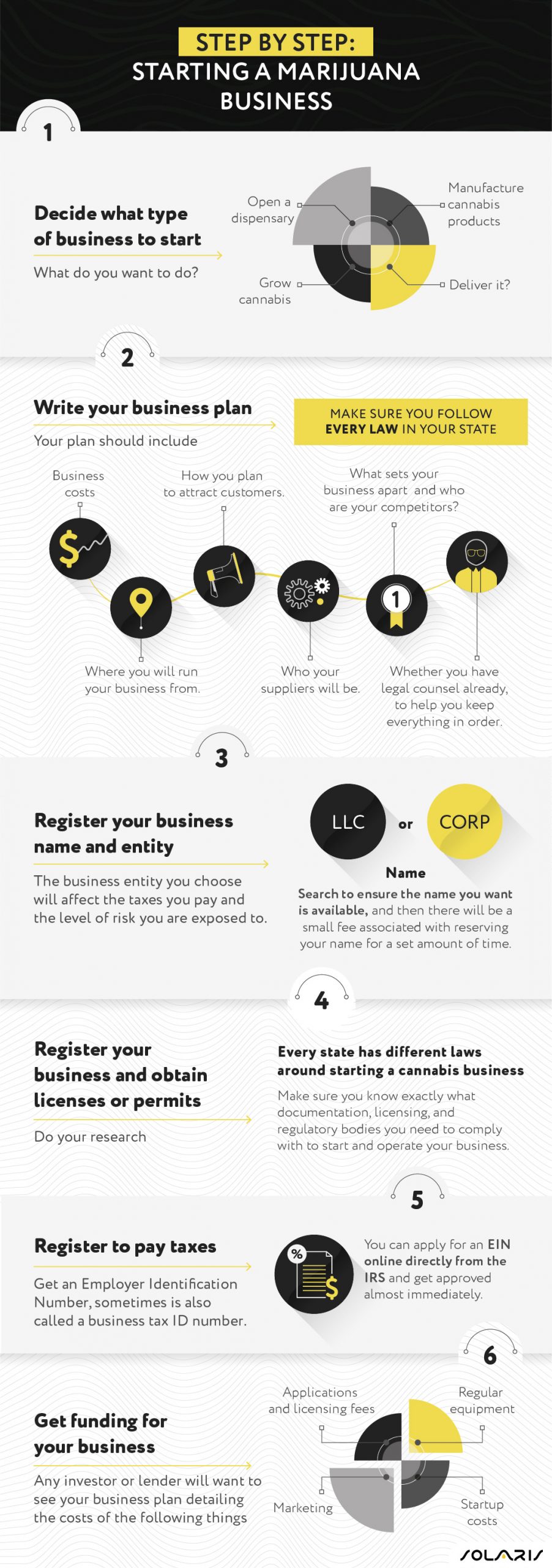The cannabis industry is newly legal, and as the industry shifts from the black market into the mainstream, it has experienced unprecedented growth.
Building an industry from the ground up takes a lot of hands; the cannabis industry has attracted entrepreneurs of all kinds, from cultivators to distributors to tech experts, all of whom want a piece of the multibillion-dollar pie.
While the industry has already experienced rapid growth, projections suggest it is still in its early stages. With seemingly nowhere to go but up, you might be considering launching a marijuana business of your own.
What is the marijuana industry like?
Before you start any business, you should figure out what the industry landscape is like.
What are the earning potentials? What are the risks? Who is your competition?
Given the marijuana industry’s short history, no one can be fully confident in how the cannabis industry will unravel and how marijuana businesses will fare.
A huge thing to consider is the demand in your area where you are planning to start your marijuana business and how you can set yourself apart from others offering the same service. The competition is fierce and will only get stronger.
As more and more states legalize the drug, marijuana businesses are presented with more profit-earning potential. Since legalization in 2014, Colorado’s regulated cannabis industry sales have topped $6 billion. And sales are projected to reach $50 billion by 2026, further proving the potential of a lucrative industry.
Application process
Starting a licensed marijuana business involves significant regulatory hurdles as well as significant start-up costs.
For example, depending on where you are applying for a business license, the application fee alone can cost tens of thousands of dollars. Also, the application fee is non-refundable, and will be forfeited regardless of whether your application is approved.
If you want to submit an application that has a decent shot at winning state approval, you may need to hire a consultant to assist you with the application process. These consultants are not cheap. They, too, can cost tens of thousands of dollars. They may even try to negotiate an equity stake in your new company.
These consulting groups are happy to share their expertise with less-experienced cannabis entrepreneurs. Those with successful track records of winning business licenses can charge a premium, especially in states like Connecticut and Illinois, where licenses are limited to a predetermined cap.
Types of marijuana business licenses
There are five main types of cannabis business licenses:
- Cultivation
- Manufacturing
- Distribution
- Testing facilities
- Transport services
Some states offer licenses for transport companies while other states do not allow cannabis delivery companies at all.
For businesses that touch the plant, licensing and permitting is essential. The process varies by state and can be rather arduous. In addition to outlining policies and procedures, applicants must provide an overview of who comprises their organization and to prove that what they say is true.
Taxation
Since cannabis remains federally illegal, cannabis companies face different taxation challenges from other industries. Most notorious of these challenges is the Internal Revenue Service’s Section 280E, which does not allow cannabis companies to deduct ordinary business expenses from their tax bills.
Section 280E stipulates that any expenses related to the “trafficking of controlled substances” shall not be eligible for deductions or credits. Since cannabis remains a controlled substance under federal law, state-compliant legal cannabis businesses are subject to this tax rule.
The result is that cannabis businesses pay a larger amount in taxes than they would if they sold a federally legal product. Cannabis companies must pay taxes based on their gross income, rather than their income minus cost of goods sold. The result is an average effective tax rate of 55% on cannabis businesses, compared with an average effective rate of 30% on similarly situated non-cannabis companies.
Beyond the federal tax code, cannabis companies must abide by various state tax plans. Some states charge excise taxes on top of their normal tax structure, such as Washington, where cannabis companies owe an excise tax of 37% on all sales.
Your tax obligations as a cannabis business owner are significant and sometimes complex, so be sure to familiarize yourself with both federal and state tax policies.
Banking and finance
Another problem caused by the federal prohibition centers on banking. Many banks are hesitant to do business with cannabis-related companies, while others refuse outright. Working with cannabis businesses is a risk for banks: On one hand, it opens the bank up to additional oversight and liability; on the other, there is a palpable fear that a federal crackdown could result in seized assets and a business catastrophe.
The lack of conventional banking options has led cannabis entrepreneurs, especially those who touch the plant, to work primarily in cash. Not only does that put them at a higher risk of robbery, but tracking cash payments for tax and regulatory purposes is incredibly difficult.
Moreover, cannabis businesses are often unable to open a traditional line of credit, limiting a common early-stage option for additional growth financing.
Luckily, the industry has developed some workarounds in the meantime. Angel investors willing to take the risk provide a lot of startup and growth capital, and several startup accelerators and incubators have burst onto the scene to help their cohorts get to the next level.
Venture capital firms tend to play it closer to the vest but are also intently watching the industry and making some preliminary investments. Still, the industry is hoping that the federal prohibition will soon be lifted, opening access to traditional banking and improving marijuana’s already immense growth prospects.
Step by step: Starting a marijuana business

Starting a marijuana business can be tricky, especially with current laws and restrictions. Considering the information on what to expect with starting your own weed business, let’s look at the steps that are necessary to take.
Step 1: Decide what type of business to start
Normally, the first step for starting a business would be coming up with a business idea. Do you want to open a dispensary, grow cannabis, manufacture cannabis products, or deliver it?
It is important to remember that with marijuana businesses the laws from state to state can change drastically and you need to be very sure of them before taking action. You will want to spend a lot of time doing your research so you completely understand the rules. Talking to people who have started cannabis businesses of their own is a good place to start.
Step 2: Write your business plan
Like with any business, you need a business plan before you can start doing anything else. First of all, make sure you are following every law in your state. From where you want to open your marijuana business to who your suppliers will be, make sure everything is in line with the law.
Your business plan will likely continue to change as the laws do, but it is key to have it in place when you are first starting a cannabis business. When you create your first business plan make sure it includes:
- Business costs, and when you plan to turn a profit.
- How you plan to attract customers.
- What sets your business apart from others like it, and who are your competitors?
- Where you will run your business from.
- Who your suppliers will be.
- Whether you have legal counsel already, to help you keep everything in order.
Step 3: Register your business name and entity
Since marijuana is not legalized on the federal level, and national prohibitions prevent the interstate sale of cannabis, big businesses have generally stayed away from the cannabis industry thus far, making it a prime industry for local businesses to enter.
Your marijuana business will likely be local and on a smaller scale, but you still need to choose a business entity that is right for you. The business entity you choose will affect the taxes you pay and the level of risk you are exposed to.
You might be leaning toward opening your business as a limited liability company, also called an LLC, or maybe a corporation. Both entities can shield owners from personal liability but there are some key differences when it comes to LLC vs. corporation.
You also will need to choose a name for your marijuana business. The process for choosing a business name will be specific to your state, but generally, you will need to conduct a search to ensure the name you want is available, and then there will be a small fee associated with reserving your name for a set amount of time. Nail down both of these things before you try and register your marijuana business, as you will need this information to do so.
Step 4: Register your business and obtain licenses or permits
Every single state has different laws around starting a cannabis business, and therefore, different types of business licenses, permits, and registration practices will be required depending on where you want to open your business.
Before starting a business, know exactly what documentation, licensing, and regulatory bodies you need to comply with to start and operate your business.
Some states, like California, have portals designed specifically for the licensing of marijuana businesses, and entire websites designed for business owners looking to start a marijuana business. Keep in mind that simply being a marijuana retailer or dispensary owner also comes with different rules and regulations than a business that grows or delivers cannabis.
All of these cannabis-specific permits, licenses, and registrations come in addition to registering your business in the state, simply to be cleared to do business there.
Step 5: Register to pay taxes
No matter where you are starting your cannabis business, you should apply for an Employer Identification Number, which is sometimes also called a business tax ID number. You can apply for an EIN online directly from the IRS and get approved almost immediately.
You will need it when tax season rolls around and you are looking at paying payroll and income taxes for your business. Your EIN will also be necessary if you decide to open a business bank account or credit card, or if you apply for funding.
Step 6: Get funding for your business
Every new entrepreneur has to face the reality of business startup costs. Those starting a marijuana business, though, might have more expenses than a typical business. And if you find that you cannot cover all these initial expenses yourself, you may look for funding to start your business.
Any investor or lender you go to looking for money will want to see your business plan to know if you have thought it out and that you have a plan to turn a profit. The applications and licensing fees, paired with any regular equipment, marketing, and startup costs you might face, make starting a marijuana business an expensive endeavor.


